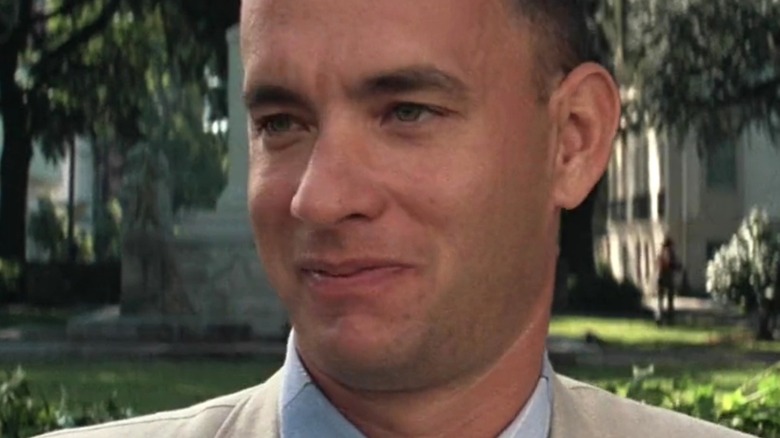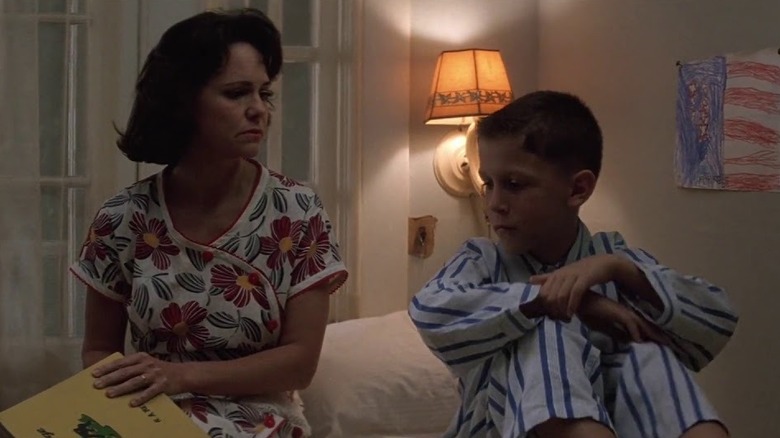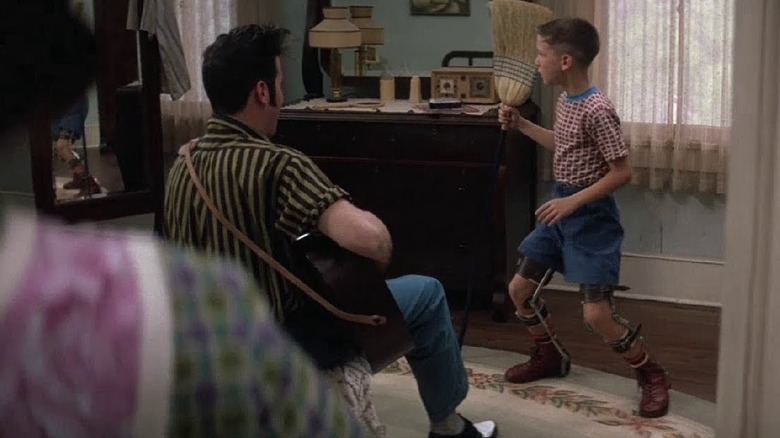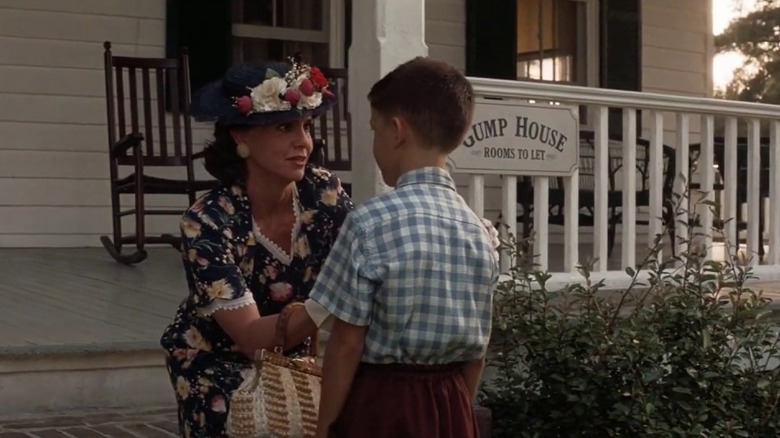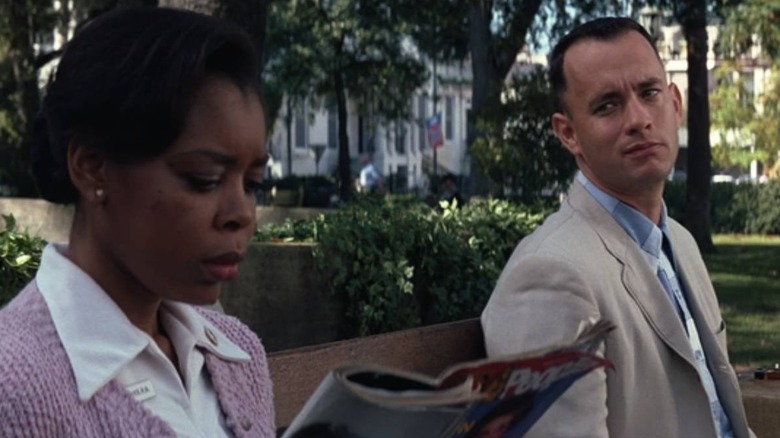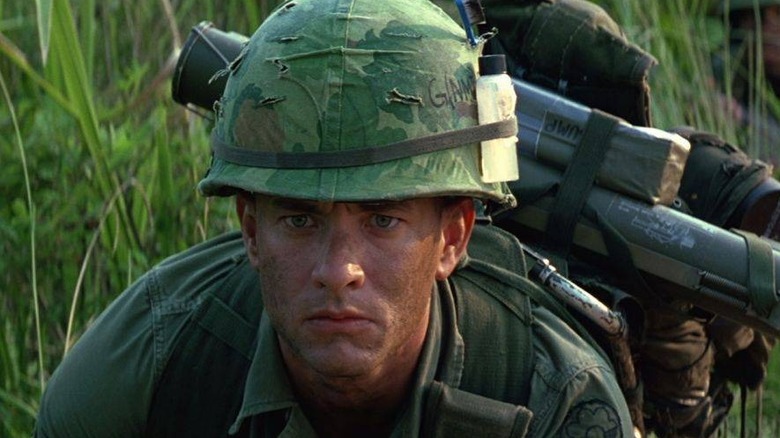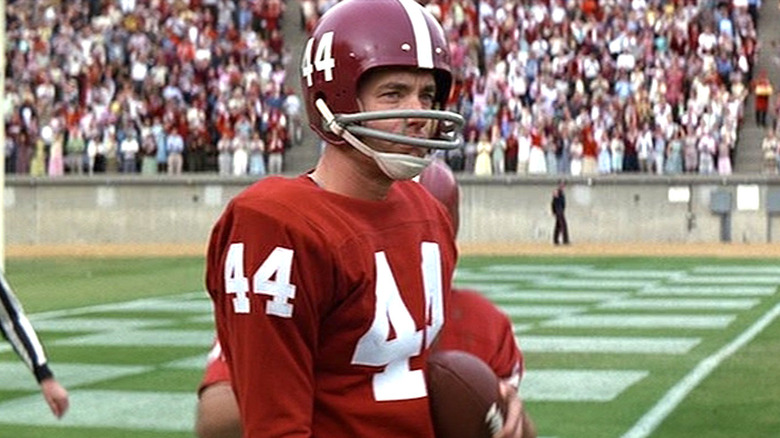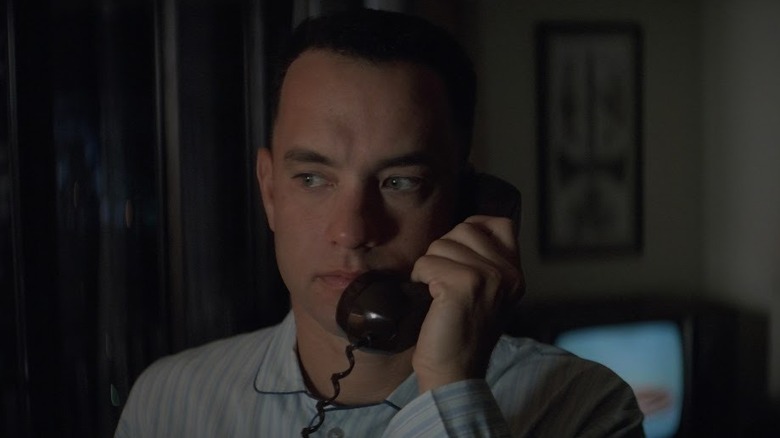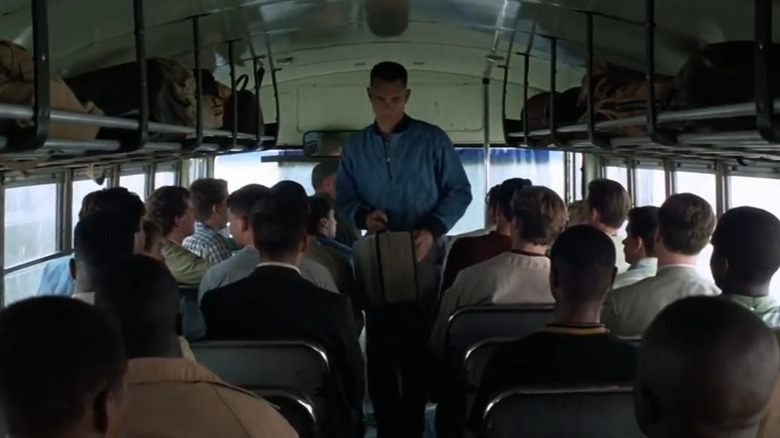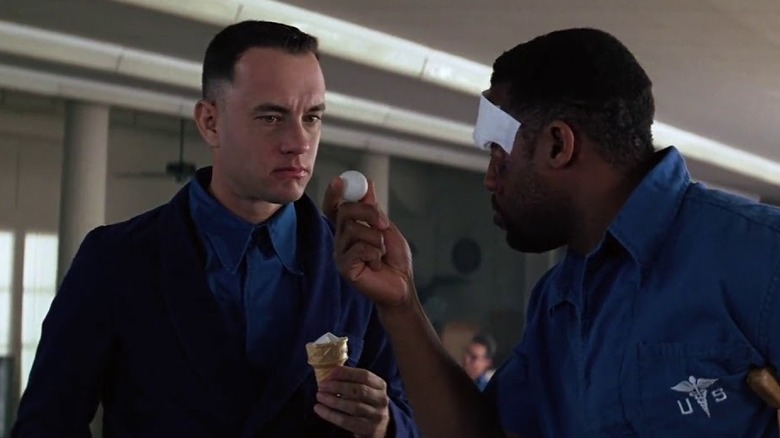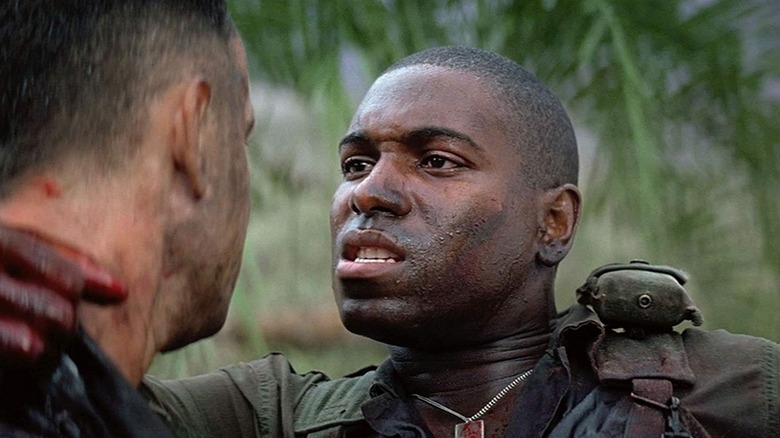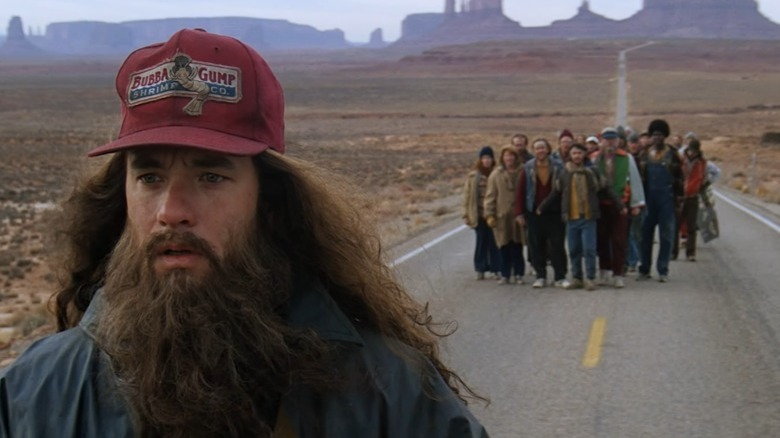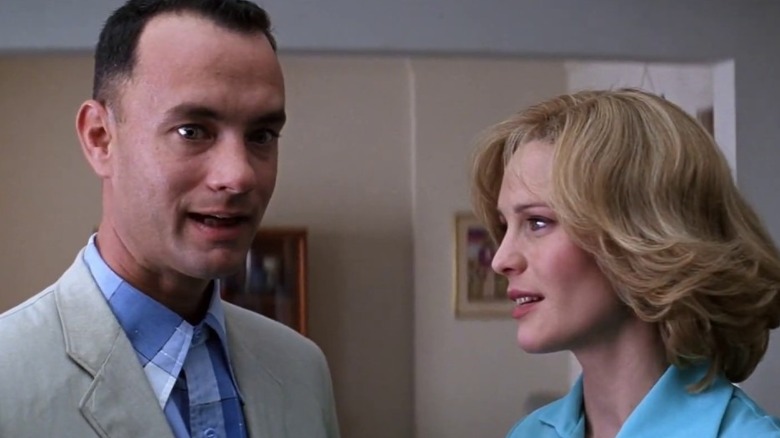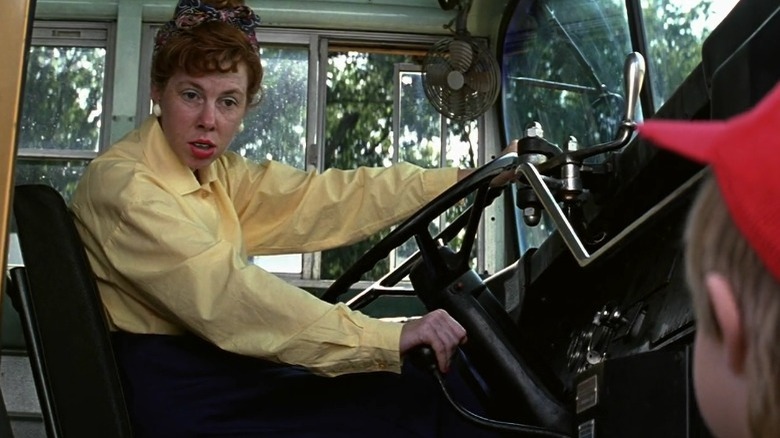The Biggest Unanswered Questions From Forrest Gump
The 1994 dramedy "Forrest Gump" – based on Winston Groom's novel of the same name – tells the story of the titular man and his extraordinary life. Forrest finds himself not only accomplishing remarkable personal achievements, but he ends up crossing paths with multiple real-life figures and plays key roles in various historical events. Apparently, Forrest was involved with everything from helping to expose the Watergate scandal to inspiring John Lennon's "Imagine" lyrics, coining major catchphrases, and teaching Elvis Presley his signature gyrations.
"Forrest Gump" was almost universally beloved at the time of its release by both audiences and critics, eventually racking up numerous Academy Awards, including the second of back-to-back best actor wins for Tom Hanks. In the years since things have seemingly split off into two major camps — those who still recall the movie fondly and consider it a classic, and critics such as IndieWire who feel aspects of the movie have aged poorly. In fact, some of those critics even feel that the world was wrong for ever praising it to begin with.
No matter where you fall on that spectrum, there's no denying that the movie leaves a few mysteries unsolved and sets up a few threads that it never fully sees through. Here are the biggest unanswered questions from "Forrest Gump."
What actually happened to Forrest's dad?
When Forrest is recalling his life, he picks things up around age seven or so, at which point it is only he and his mama — who is played by Sally Field and never given a name beyond Mrs. Gump. Forrest's dad isn't in the picture at that point and never is for as much of Forrest's life as the movie follows. While the novel clearly states that Mr. Gump was a longshoreman who died at sea, the movie makes no mention of his job or his fate.
All we see Mrs. Gump tell Forrest is that his dad is on "vacation," and she goes on to explain that vacations are permanent and people who go on vacation are never seen again. Given the disdain in her voice as she says this, it seems unlikely that her husband perished. Rather, we assume that he must have abandoned his wife and child at some point before Forrest was old enough to have any memories of him. Still, ultimately all we can do is assume because this is all that is ever said of Mr. Gump and he's never seen nor mentioned for the rest of the movie.
How does Forrest's curved spine get permanently healed so easily?
What seemingly inspires Forrest to first start chatting with strangers on the bus stop bench is when he notices a woman's shoes, and this prompts him to tell the story of how he had to wear leg braces as a child due to a curved spine. Since this part of the story is set in small-town Alabama during the 1950s, the braces are very rudimentary and seem like they were cobbled together using an erector set and some leather straps. They also completely fall apart the first time he ever fully broke into a run with them on – but not before his limited range of movement in them ends up inspiring Elvis Presley's iconic dance moves.
Not only that, but Forrest apparently only needs to wear them for a very short time before his curved spine is completely healed. He is instantly able to run at an above-average speed, and we see him eventually become an all-star college football player and later do a three-year cross-country run without any issues whatsoever. So was his original curved spine diagnosis wrong? How could such wonky leg braces not only completely cure his curved spine in just a matter of weeks but also cure it so entirely that Forrest had zero physical issues well into his 30s?
Were the boarding house visitors the only source of income for Mrs. Gump?
Another thing mentioned in the "Forrest Gump" novel regarding Mr. Gump is that his wife received a pension from his death that helped her make ends meet. That would certainly help to explain why she was able to have such a large, beautiful house on a gorgeous stretch of land. However, in the movie, that doesn't factor in – so how does she pay the bills when we don't see her ever go to or talk about a job of any kind?
The Gumps do live in a boarding house that seems to frequently be full, and Mrs. Gump mentions that this is how they are able to get by. Still, would that alone be enough for her to keep a house and raise a son? How much could she have possibly been charging for a room in a fairly remote house in the '50s and '60s?
It just doesn't seem like it would've brought in enough stable income for her to be able to afford such a big house on such a large plot of land, keep all of that well maintained – which it always was – and still give Forrest what seemed to be a pretty decent upbringing. Was she just that thrifty and knew how to stretch a dollar as far as possible?
Did Forrest not wear shoes prior to age seven?
As previously mentioned, the impetus for Forrest to begin telling his life story – thus setting the entire movie in motion – is his comments about the shoes of a woman sitting near him at the bus stop. He goes on to talk about how much appreciation he has always had for a good pair of shoes and claims to remember what he says are the first pair of shoes he ever owned. The movie then cuts to him at the doctor's office, being fitted for his leg braces.
Wait a minute, though – Forrest is already around seven years old during this flashback. So if we are seeing the first pair of shoes he ever had, does that mean that he wasn't wearing shoes at all for the first six years of his life? It's possible he meant his first pair of new shoes and his mom had been putting hand-me-down shoes on him up to that point, but that's not what he says. All we can do based on his own words is come to the conclusion that he went shoeless until he was seven years old.
What actual developmental disabilities, if any, does Forrest have?
Forrest has faced a lot of adversity in his life, starting from a young age. Many of his peers call him stupid, and the principal at his school tells his mama he is "different" and that he has a below-average IQ. On top of all that, he obviously has trouble picking up on social cues and struggles to make friends — save for a few notable exceptions. So just what is his deal, really?
The movie never gives Forrest any diagnosis in terms of mental health or developmental issues, and he's never seen visiting school counselors or other specialists of any kind — beyond the doctor who treats his curved spine. To be fair, understanding of developmental disabilities and mental health, in general, wasn't quite as advanced when Forrest was growing up as it is now, so it's perhaps realistic that Forrest is never diagnosed with or treated for anything along those lines (via The Mighty).
Still, it leaves open the question of what, if anything, might have actually been going on with him while everyone around him was just dismissing him as different or unintelligent.
If Forrest has been all over television, magazines, and newspapers, why doesn't anyone seem to recognize him?
By the time Forrest is at the point where he's sitting at the bus stop to go visit Jenny, he's had quite the life. Actually, he is a full-blown celebrity at that point, having made multiple appearances on television, magazine covers, and in newspaper articles.
For instance, he is one of the owners of a successful shrimping business, used to play football for the famed Alabama Crimson Tide (his games would've been televised), and had become a world-champion ping-pong player. Beyond that, he was featured in news reports about his multi-year cross-country run and was filmed meeting multiple U.S. presidents — including one he showed his rear end. In other words, most people should've been able to recognize both his name and face from any or all of those things.
Yet, not a single person that he talks to on the bus stop bench recognizes him. Moreover, when he reveals himself to be the Gump half of the Bubba Gump Shrimp company, a man thinks he is lying and laughs at him for it. It seems pretty unlikely that none of the handful of people he talks to at the bus stop recognized him either immediately after sitting near him — or at least shortly after he begins recounting his adventures.
Wouldn't Forrest have been a key witness in the Watergate investigation?
Forrest finds himself inadvertently involving himself in various historical events throughout "Forrest Gump," most of which are nothing more than inspiring some pop culture item in a direct or indirect way. It's perhaps not so hard to believe that John Lennon wouldn't have made a point to credit him for inspiring the lyrics of "Imagine," or Elvis for his dance moves, or the smiley face guy for being the original model for the image.
However, the fact that Forrest ends up calling the front desk at a hotel because the flashlights are keeping him up – which is what brings the authorities to catch the people behind the Watergate scandal – should've meant that he got more credit for what he did. He likely would've had to first be interviewed by the authorities, probably multiple times, and even possibly had to testify in court about what he saw and who he called about it. This was a scandal that brought down an entire presidency, after all (per History). So did nobody ever follow up with him, or did he just deem that part of his life story too boring to relay to people?
Why did the other recruits on the army bus not want Forrest to sit by them?
There is a scene early on in "Forrest Gump" that sees Forrest as a child getting on a school bus – presumably for the first time – only to have most of the kids refuse to let him sit next to them. There is a number of reasons why the kids are being so cruel to him, from knowing of his social awkwardness to his leg braces. At any rate, it really doesn't require much explanation as to why kids would be cruel. It is here he first meets Jenny, who is the only person who lets Forrest sit next to them.
Later in the movie, an older Forrest gets on a bus full of fellow army recruits. Echoing that earlier bus scene, the other guys all rebuff Forrest's attempts to sit next to them, only to find an empty seat next to Bubba — who he makes fast friends with.
However, in this case, it doesn't make sense why the other guys are so cold to Forrest. We can presume that few, if any, of the recruits on that bus know one another, so there's no reason why they would be weird about Forrest sitting next to them. Beyond that, Forrest doesn't appear to stand out in any way at this point, as he did in the earlier scene, so there's no real explanation for the cruelty he faces on this bus.
Was ping pong ever actually popular enough to justify paying someone a lucrative endorsement deal?
While in the hospital recovering from the injury he received in battle, Forrest becomes interested in ping pong when he sees other patients playing it. Like with most pursuits he takes on, Forrest catches on to the sport very quickly and soon is extremely proficient at it. In fact, he masters the sport in just the amount of time he spends healing from a relatively minor injury — it wasn't as though he had to stay for months and months in the hospital.
Putting aside how quickly he teaches himself to become an incredible table tennis player — to the point that he is chosen to play against the best Chinese players — Forrest becomes something of a minor celebrity in the sport. No disrespect to table tennis, but it's never exactly been the kind of sport to draw fandoms at the same scale as, say, baseball or football. So no matter how incredible of a ping pong player he might have been or what heights he might have reached in the sport, it seems dubious that a company would see fit to pay him a lucrative endorsement deal that uses his name and likeness to sell ping pong paddles.
Does Bubba's family keep making money off Bubba Gump Shrimp after Forrest leaves the company?
Considering that Forrest made his fortune in the shrimping business, it's only right that he thank the person who gave him the idea to go into that line of work in the first place, as it's not exactly something that ever would've occurred to Forrest on his own. When Bubba dies in battle in Forrest's arms and is never able to fulfill his dream of owning a shrimping boat, Forrest still keeps his promise of the two going into business "together" by including Bubba's name in the name of the company and giving part of the profits to Bubba's family – something he has no legal obligation to do.
What isn't clear is how much or how often Forrest sends money to Bubba's family. We see his mother fainting at the sight of the first big check, meaning it was a sizable amount. We also see her later living in a mansion with a staff.
However, Forrest eventually leaves the business behind to settle back into a quiet life in his childhood home. Does he still own a piece of the company, or did he sell his half off and it's half of that payout that he sends to Bubba's family? Moreover, does Forrest ever officially cut Bubba's family into the company so that they keep making money off of it even if Forrest is no longer part of it or was he just paying them cash from his own pocket and that ended when he gave up his part of the business?
Who takes care of Forrest's house while he's running cross-country for three years?
There are a few things that happen in "Forrest Gump" that are a little hard to believe, even in a movie that is entirely built on the audience's ability to suspend their disbelief a bit. One moment – that wasn't in the original novel, by the way – is when Forrest is hurt over Jenny's disappearance after they spend the night together and decides to run back and forth across the United States for three straight years.
There are several questions that can be asked about that time – where does he sleep, how many breaks does he take, how often does he bathe, what happens to his crowd of followers any time he does stop somewhere for the night – but the most pressing issue is his house.
He takes off and literally leaves his front door wide open and presumably doesn't return for the entire three-year odyssey. Was anyone looking after his house? Do animals come in since the door was wide open? Does anyone cut his grass? How do his utility bills get paid? You can't just leave a house completely untouched for three years and not have things fall into disrepair and have the county declare it abandoned.
Would Jenny have told Forrest about his son if she never got sick?
Jenny makes a lot of questionable decisions over the course of "Forrest Gump." Sure, she had a really rough upbringing, followed by coming of age at a time of major social and political turmoil, so an argument can be made that it's not her fault she can't seem to stay off of self-destructive paths. Either way, in terms of Forrest in particular, she is often a selfish friend who punishes him for only trying to do what is best for her.
She probably feels she is doing the right thing by not burdening Forrest with a child and just wants to let him live his life without that baggage. Right or wrong, that is the choice she makes, trying to go it alone as a single mother until she is faced with a terminal illness and wants to make sure Forrest Jr. ends up with his dad after she is gone.
However, one thing that will forever be impossible to know is whether or not Jenny would've told Forrest about Forrest Jr. if she never contracted HIV, which was confirmed as the unnamed virus by screenwriter Eric Roth in an interview with Yahoo Entertainment. Would she have just never spoken to him again and raised Forrest Jr. all on her own until he was an adult, or would she have still reached out to Forrest sooner or later?
How did the school bus driver barely age in 30 years?
This one is a little bit nitpicky, but it still bears mentioning, as it's a rather jarring moment that doesn't make a lick of sense. Towards the end of the movie, when Forrest Jr. goes to live with his dad following Jenny's death, he ends up riding the same bus route to school that Forrest did as a child. Beyond that, he immediately knows the bus driver's name despite having never met her before. Why? Because it's the same bus driver Forrest had as a child.
Other than dressing a little bit older, the actor that plays the bus driver – Siobhan Fallon Hogan – looks pretty much exactly the same. This is strange since she's playing the character in both the mid-1950s and in the early-1980s. Even putting her at a relatively young when she was Forrest's bus driver, she still had to be an adult, probably in her early 20s. So she'd be, at the youngest, in her early-50s when she was Forrest Jr.'s bus driver and should look noticeably older.
In a movie where they used fancy special effects to make Forrest interact with real footage of dead celebrities and politicians, they couldn't do a little something to make Hogan look like she aged a couple of decades?
